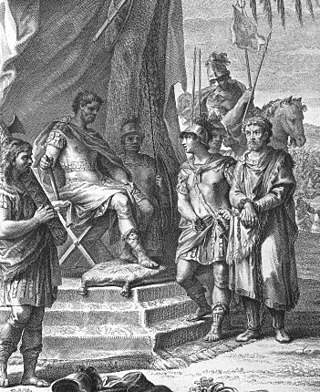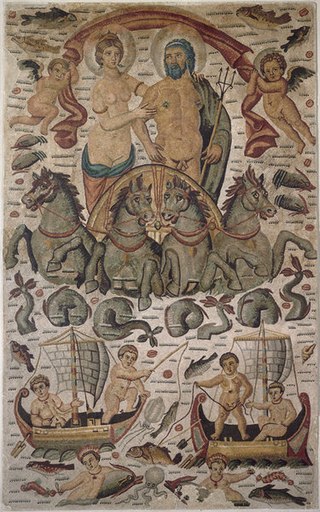An editor has nominated this article for deletion. You are welcome to participate in the deletion discussion , which will decide whether or not to retain it. |
This is a list of battle that were fought in present day Algeria geographically.
An editor has nominated this article for deletion. You are welcome to participate in the deletion discussion , which will decide whether or not to retain it. |
This is a list of battle that were fought in present day Algeria geographically.

Much of the history of Algeria has taken place on the fertile coastal plain of North Africa, which is often called the Maghreb. North Africa served as a transit region for people moving towards Europe or the Middle East, thus, the region's inhabitants have been influenced by populations from other areas, including the Carthaginians, Romans, and Vandals. The region was conquered by the Muslims in the early 8th century AD, but broke off from the Umayyad Caliphate after the Berber Revolt of 740. During the Ottoman period, Algeria became an important state in the Mediterranean sea which led to many naval conflicts. The last significant events in the country's recent history have been the Algerian War and Algerian Civil War.

Jugurtha or Jugurthen was a king of Numidia. When the Numidian king Micipsa, who had adopted Jugurtha, died in 118 BC, Jugurtha and his two adoptive brothers, Hiempsal and Adherbal, succeeded him. Jugurtha arranged to have Hiempsal killed and, after a civil war, defeated and killed Adherbal in 112 BC.

The Maghreb, also known as the Arab Maghreb and Northwest Africa, is the western part of the Arab world. The region comprises western and central North Africa, including Algeria, Libya, Mauritania, Morocco, and Tunisia. The Maghreb also includes the disputed territory of Western Sahara. As of 2018, the region had a population of over 100 million people.

The Jugurthine War was an armed conflict between the Roman Republic and King Jugurtha of Numidia, a kingdom on the north African coast approximating to modern Algeria. Jugurtha was the nephew and adopted son of Micipsa, king of Numidia, whom he succeeded on the throne, he had done so by overcoming his rivals through assassination, war, and bribery.
The Zayyanid dynasty or Abd al-Wadids was a Berber Zenata dynasty that ruled the Kingdom of Tlemcen, mainly in modern Algeria centered on the town of Tlemcen in northwest Algeria. The Zayyanid dynasty's rule lasted from 1235 to 1557.

Cirta, also known by various other names in antiquity, was the ancient Berber, Punic and Roman settlement which later became Constantine, Algeria.
Hasan Pasha was the son of Hayreddin Barbarossa and three-times Beylerbey of the Regency of Algiers. His mother was a Moorish woman from Algiers. He succeeded his father as ruler of Algiers, and replaced Barbarossa's deputy Hasan Agha, who had been effectively holding the position of ruler of Algiers since 1533.
The Battle of Wadi al-Laban occurred in March–April 1558 between Saadians and Ottoman Algerian forces under Hasan Pasha, the son of Hayreddin Barbarossa. It took place north of Fes, at Wadi al-Laban, an affluent of the Sebou River, one day north of Fes.

Turkey–Morocco relations are the foreign relations between Morocco and Turkey, and spanned a period of several centuries, from the early 16th century when the Ottoman Empire neighbored Morocco to until modern times.

Roman colonies in North Africa are the cities—populated by Roman citizens—created in North Africa by the Roman Empire, mainly in the period between the reigns of Augustus and Trajan.

Conflicts between the Regency of Algiers and the Cherifian dynasties or Algerian-Sherifian conflicts opposed Morocco to the Ottoman Empire and its dependencies in a series of wars between the Regency of Algiers and its allied local sultanates and tribal confederations, and on the other hand, the Sharifian Saadian and Alawite dynasties that had ruled Morocco since the 16th century.
The Campaign of Tlemcen or Tlemcen campaign was a military operation led by the Saadians of Mohammed ash-Sheikh against Tlemcen in 1557, then under the domination of the Regency of Algiers, a vassal state of the Ottoman Empire. Mohammed ash-Sheikh, who wanted to conquer Algeria, occupied the city but failed to seize the Mechouar Palace, which was defended by a garrison of 500 men under the command of Caïd Saffa.

The Campaign of Tlemcen (1551) was a military operation led by the Regency of Algiers under Hasan Pasha and his ally Abdelaziz, following the capture of Tlemcen by the Saadi Sultanate in June 1550.
The Battle of Hippo Regius was a naval encounter during Caesar's Civil War which occurred off the coast of the African city of Hippo Regius in 46 BC. Metellus Scipio and a number of influential senators from the Optimate faction were fleeing the disastrous Battle of Thapsus when their fleet was intercepted and destroyed by Publius Sittius, a mercenary commander in the employ of the Mauretanian king Bogud, an ally of Gaius Julius Caesar's. Scipio committed suicide and all of the other senators were killed during the battle.
The Maghrebi war (1699–1702) was a conflict involving a Tunisian, Tripolitanian, and Moroccan coalition, and the Deylik of Algiers. It was an important milestone in the further weakening of the already fragile Ottoman grip over the Maghreb, as both sides utterly ignored the Ottoman sultan's pleas to sign a peace treaty. This war also led to the renewal of the Muradid infighting, which would later lead to the establishment of the Beylik of Tunis, and the Husainid dynasty in 1705.